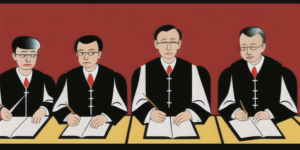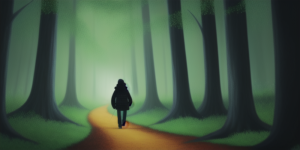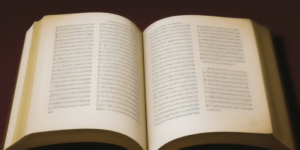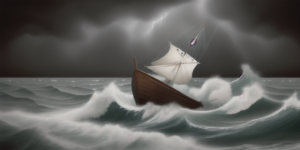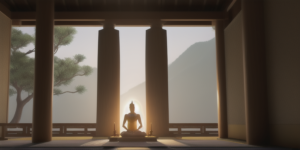Are we truly at the pinnacle of evolution, or are we standing at the precipice of an illusion? A species, blessed with the intellectual capacity and the consciousness to shape our destinies, yet we stand marred by self-destructive tendencies. Is this the evolutionary peak, or is this a regressive pitfall in our spiritual journey?
Take a good, hard look at our so-called “advanced” society. We are a species that has managed to crack the code of our genetic blueprint, yet we squabble over petty differences. Our news headlines are a cacophony of conflict, strife, and intolerance. Is this the mark of an evolved, conscious species? Or is this indicative of an evolutionary journey that has tragically gone astray?
Animals, driven by their instincts, follow a destined path set by nature. They may not bear the burden of morality or responsibility, but they also do not wreak havoc upon their own kind or their habitat out of greed or avarice. In contrast, humans, supposedly the epitome of evolution, are consciously causing irreparable harm to each other and the planet. This is the cruel irony of our evolution.
We possess a power unparalleled in the natural world, a cognitive ability that bestows us with a greater responsibility for our actions. And yet, we often act in ways that are remarkably lower than those we consider “beneath” us.
Our responsibility extends to every decision, every action, and every consequence that arises from them. Unlike animals, who operate based on instinct and aren’t morally accountable for their actions, we possess an awareness of our deeds and their implications. Yet, we often behave in a manner that not only fails to honor this responsibility, but also undermines our alleged superiority as conscious beings.
We wage wars, exploit resources, and treat fellow humans with contempt and prejudice. We ravage the very planet that sustains us, oblivious to the fact that we are biting the hand that feeds us. Animals, driven by instinct, act out of a need for survival, not out of greed or malice. Yet, we, the conscious ones, commit atrocities that no animal would. Are we not, then, worse than the very animals we deem lower?
The human paradox is thus laid bare: we possess consciousness but often fail to demonstrate the wisdom that should accompany it. We have the power to shape our destinies but often make choices that lead to self-destruction. We stand at the peak of evolution yet behave in ways that suggest a fundamental regression.
We pat ourselves on the back, proud of our technological marvels and scientific breakthroughs. We deem ourselves superior because we can make choices, because we possess consciousness. Yet, in our blind celebration of material and technological progress, we overlook the grim reality: our spiritual evolution has not kept pace with our physical and technological evolution.
As we bask in the glories of the internet age and the digital revolution, we neglect to see that we’re turning into mechanistic entities.
Let’s not fool ourselves. We may have climbed the physical ladder of evolution, but we have plummeted in our spiritual journey. The real test of our evolution lies not in our ability to create sophisticated technologies, but in our capacity to exhibit kindness, compassion, and mutual respect. Judging by the current state of affairs, we have miserably failed in this test.
Our destiny is no longer in the hands of evolution. We are beyond the point where nature can guide us. We are on our own, armed with consciousness and free will. Our fate, now, lies in our own hands. The question is, are we mature enough to handle it? Or will we continue to act like children, throwing tantrums when we do not get what we want?
It is high time we shun this self-centered, ego-driven mentality and adopt a perspective that extends beyond the self. It is time to rise above the collective unconsciousness, to forge our individual path towards self-awareness and spiritual maturity.
Some would say “I’m totally comfortable with my life and I do not need to evolve anymore.” Or many would surrender to “Karma”. This mindset propagates a complacency that is not merely stagnation; it’s a gateway to regression. This belief is particularly potent when viewed through the lens of Buddhism and its concept of the six realms of rebirth.
According to Buddhist teachings, life is a cycle of birth, death, and rebirth, spiraling through the six realms of existence. These realms are not static destinations, but rather the manifestation of our karma, our actions, and the state of our consciousness. By choosing not to evolve or progress, we set ourselves up for a descent rather than just a static existence.
The idea of not seeking to evolve or improve oneself spiritually might seem harmless or even appealing in its simplicity. After all, it requires less effort, less introspection, and less discomfort than striving for change and growth. Yet, Buddhism posits that this mindset leads not to stillness, but to decline.
Life, by its very nature, is dynamic and ever-changing. The universe, too, is in constant flux. To reject evolution and personal growth is to swim against the current of life. It’s to deny the fundamental law of impermanence and to resist the very essence of our human nature: our capacity for change, learning, and growth.
Our consciousness is a double-edged sword. It gives us the power to shape our destiny, but it also places upon us the responsibility of our actions. We cannot claim to be the apex species while behaving like unruly children. If we do not utilize our consciousness effectively and responsibly, we are no better than animals acting on instinct.
The clock is ticking, and the hour for us to grow up, to truly evolve, is upon us. We need to embrace our consciousness, not as a mere tool of survival, but as a beacon guiding us towards spiritual growth and self-realization. Only then can we claim to have reached the peak of evolution. Until then, we remain an under-evolved species, teetering on the brink of our own self-made abyss.
